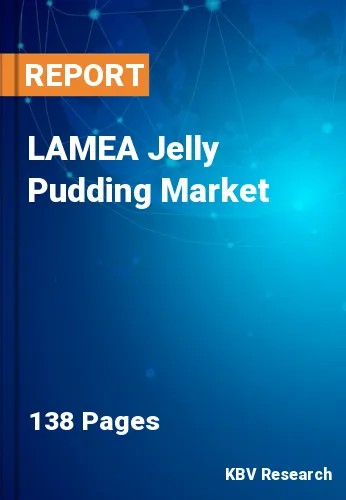
The Latin America, Middle East and Africa Jelly Pudding Market would witness market growth of 6.3% CAGR during the forecast period (2023-2030). In the year 2026, the LAMEA market's volume is expected to surge to 239.6 kilo tonnes, showcasing a growth of 7.9% (2023-2030).
The market is driven mainly by jelly pudding demand, which is influenced by taste preferences, convenience, cost, and health awareness. The industry adapts to shifting consumer preferences by providing a variety of tastes, packaging options, and healthier substitutes. Products made with jelly pudding are readily available and easily accessible. The main distribution channels for jelly pudding are supermarkets, grocery stores, convenience stores, and the internet.
Effective marketing and tactics are essential to advertise and position jelly pudding brands. Brands use a variety of channels, including TV commercials, print advertisements, social media, influencer marketing, and product placements, to raise awareness, foster brand loyalty, and draw in customers. Consumer purchase decisions are influenced by price sensitivity. Brands must balance cost-effective solutions with preserving profit margins. Value packs, price reductions, and promotions are frequently adopted to attract budget-conscious customers. Manufacturers must adhere to food safety regulations and appropriately label their products to meet consumer expectations. Regulation changes have an impact on product compositions and packaging specifications.
The Middle East has a rich culinary inheritance, and desserts are integral to its cuisine. It can be adapted to suit regional tastes and preferences, making it culturally relevant. There is a growing snacking culture in the Middle East, and jelly pudding can be a convenient and satisfying snack option for people of all ages. The Middle East has a diverse population with varying tastes and preferences. The versatility of jelly pudding in terms of flavors and ingredients allows customization to cater to different consumer segments. As health awareness increases, consumers in the Middle East are seeking healthier dessert options. With this region’s growing food services industry, the adoption of snacks like pie, pastry, and jelly pudding is growing, driving the market growth in this region.
The Brazil market dominated the LAMEA Jelly Pudding Market by Country in 2022, and would continue to be a dominant market till 2030; thereby, achieving a market value of $546.6 Million by 2030, growing at a CAGR of 5.2 % during the forecast period. The Argentina market is showcasing a CAGR of 6.9% during (2023 - 2030). Additionally, The UAE market would register a CAGR of 6% during (2023 - 2030).
Based on Flavor, the market is segmented into Fruit Flavored, Dairy Flavored, Coffee Flavored, and Others. Based on Packaging, the market is segmented into Single Serve Cups, and Multi-pack Containers. Based on Distribution Channel, the market is segmented into Specialty Stores, Convenience Stores, Supermarkets/hypermarkets, and Online Sales Channel. Based on countries, the market is segmented into Brazil, Argentina, UAE, Saudi Arabia, South Africa, Nigeria, and Rest of LAMEA.
Free Valuable Insights: The Worldwide Jelly Pudding Market is Projected to reach USD 24.2 Billion by 2030, at a CAGR of 3.9%
The market research report covers the analysis of key stakeholders of the market. Key companies profiled in the report include Now Foods Eden Foods, Karagen Indonesia (KaraIndo), The Kraft Heinz Company, Ferna Corporation, Flavourtech Pty Ltd, Heartland Food Products Group, Health Connection Wholefoods, Dr. August Oetker KG, Hoosier Hill Farm.
By Flavour (Volume, Kilo Tonnes, USD Million, 2019-2030)
By Packaging (Volume, Kilo Tonnes, USD Million, 2019-2030)
By Distribution Channel (Volume, Kilo Tonnes, USD Million, 2019-2030)
By Country (Volume, Kilo Tonnes, USD Million, 2019-2030)
Our team of dedicated experts can provide you with attractive expansion opportunities for your business.
